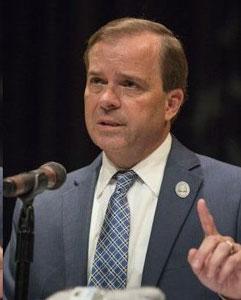 Fayetteville Mayor Nat Robertson hosted a roundtable discussion last week on the opioid epidemic sweeping the nation. Robertson and Fayetteville Veterans Affairs Director Elizabeth Goolsby have co-chaired a local task force on efforts to reduce the scourge for about a year. North Carolina Attorney General Josh Stein and more than a dozen other local and state officials in law enforcement and healthcare were in attendance to hear and learn about their successes.
Fayetteville Mayor Nat Robertson hosted a roundtable discussion last week on the opioid epidemic sweeping the nation. Robertson and Fayetteville Veterans Affairs Director Elizabeth Goolsby have co-chaired a local task force on efforts to reduce the scourge for about a year. North Carolina Attorney General Josh Stein and more than a dozen other local and state officials in law enforcement and healthcare were in attendance to hear and learn about their successes.
“I’m excited to hold this roundtable with Attorney General Stein so that our community can assist the rest of the state in reducing opioid abuse,” said the mayor. Stein applauded the effort and achievements the Fayetteville community has made to reduce opioid addiction. “The opioid epidemic is tearing families apart all across our state,” said Stein. “Fayetteville is a leader in implementing innovative programs to combat this crisis, and I’m excited to learn from the community leaders. It has taken 15 to 20 years for the state to get into this crisis and we must take it on,” he added.
The Fayetteville Opioid Abuse & Awareness Task Force focuses on reducing the number of opioid overdoses and educating providers who prescribe opioids. They also want to bring awareness about opioid addiction to the public while promoting treatment and recovery resources. “The epidemic is unlike anything I’ve seen since I’ve been district attorney,” said Billy West. “It’s the biggest problem we have in the criminal justice system,” he added.
Opioids or opiates include strong prescription pain relievers, such as oxycodone, hydrocodone, fentanyl and tramadol. The illegal drug heroin is also an opioid. The attorney general can learn a lot from Fayetteville’s Task Force on Opiate Abuse and Awareness. Opportunities for assistance in substance abuse are continuing to develop in Fayetteville. Cohen Veterans Network provides quality, accessible, comprehensive mental health care for veterans and family members. And it’s free. In a task force report for August 2016, the company said it would “open a Fayetteville facility costing between $8-$12 million.” For now, it is leasing space in a Village Drive office building, said Mayor Robertson.
Cumberland County Communicare will soon be opening a recovery center that will “provide open access for screening, assessments and referrals for anyone looking for recovery services, including substance use treatment, opioid treatment, 12-step programs and other resources,” stated the report. It has opened a 24-hour crisis phone line as well. Numerous organizations, providers and faith-based groups will volunteer their time at the call center. Recently, the Cumberland County District Attorney’s office in cooperation with local law enforcement agencies initiated the Law Enforcement Assisted Diversion (LEAD) program. It is a comprehensive program geared toward helping those addicted, not the drug dealers. This is the only program of its kind in the Southeastern United States and only one of four in the country.
Fayetteville Police got involved in combatting opiate overdoses nearly two years ago. Former Police Chief Harold Medlock equipped his patrol officers with Naloxone heroin antidotes. This medication is used to block the effects of common opioids like heroin, specifically in overdose situations. This medication, along with the dedicated training of the Fayetteville City police, can be credited with saving 55 lives since the program began. No doubt the program works and the City of Fayetteville is the recognized agent of this positive change. Now all that is needed is more state and federal money to enhance and extend the program.

 How to resolve AdBlock issue?
How to resolve AdBlock issue? 









